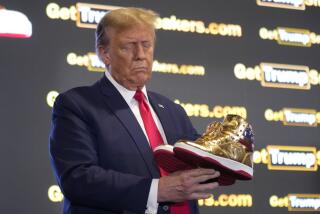Op-Ed: Why Biden should look beyond the usual pool for his Cabinet appointments

Despite President Trump’s efforts to barricade the White House doors, a presidential transition is underway, and the Biden team is close to announcing some Cabinet picks.
President-elect Joe Biden ran on a promise of more integrity in government. Yet names being floated for Cabinet positions suggest that he will draw from the same familiar Wall Street and corporate networks that have supplied personnel to Republican and Democratic administrations for decades. The policies embraced by this group have repeatedly failed ordinary Americans while protecting wealthy executives and shareholders.
If Biden can’t look beyond this circle, citizens — red and blue — are likely to conclude that the U.S. economic system is, indeed, as corrupt as they have suspected. And they will be right.
As numerous postmortems of the 2008 Great Recession and its aftermath found, blame for that disaster rests with a clique of deregulation advocates who shuttled back and forth between Wall St. and top economic jobs in Washington. A series of policies they implemented in the 1980s and 1990s almost guaranteed that a crash of epic proportions would ensue.
Those measures included repeal of the Glass-Steagall Act, which prevented depositors’ savings from being used for market speculation, failing to write crucial rules called for by Congress in a 1994 banking reform after the savings and loan crisis, and reducing the human and monetary resources dedicated to policing the financial services industry — just when a raft of exotic investment vehicles and sudden globalization of the financial system increased risk.
Then, even after millions of Americans were thrown out of their homes by the disaster that inevitably resulted, the newly ensconced Obama administration opted to continue relying on members of this same network, appointing them to key positions. Lawrence Summers, for example, helped direct President Clinton’s deregulation push as Summers rose through the ranks at Treasury to serve finally as secretary. He went on to direct President Obama’s National Economic Council, while his protege Timothy Geithner served as his successor heading Treasury.
After Congress, guided by the counsel of such financial “wizards” as well as by industry lobbyists, bailed out offending financial institutions and corporations, Obama’s team failed to enforce meaningful conditions to bring relief to victims.
The Justice Department at the time was run by Eric Holder, with Lanny Breuer heading the criminal division. Both of them had worked for a law firm representing many of these same financial institutions, and they failed to aggressively prosecute the executives who engineered the disaster. In the end, the New York Times reported, only a single banking executive served time for the many financial crimes that harmed so many Americans.
Ordinary people trying to put their lives back together after the Great Recession have seen in these events the workings of a rigged system. After a dozen years analyzing corruption in such developing countries as Afghanistan, Honduras, Nepal and Nigeria, I do too.
In those countries, I found that bribery — direct payoffs to public officials to induce them to do (or not do) their jobs — is only the visible seam of a broader fabric of corruption. The deeper harm is done by social networks of top government officials and members of the elite who run the nation’s key businesses and industries.
While specific criminal acts such alliances perpetrate are difficult to expose, I have seen numerous examples of such ruling networks distorting laws and repurposing or crippling agencies and institutions to make them serve the aims of the elite at the expense of the people.
Over the past 40 years, this pattern has in many ways come to characterize the U.S. system. The web of people shuttling back and forth between the Defense Department or White House and military contractors, for example, has delivered bloated defense budgets lavished on overpaid contractors and weapons systems that often don’t work. Many of the contractors involved are repeat violators of federal laws and regulations. The superhighway connecting Wall Street and major corporations to Treasury and the Federal Reserve is another stark example.
While Biden’s picks won’t be as obviously egregious as those of Trump, who placed whole government agencies in the hands of the industries they were supposed to be regulating, some leading candidates for key positions are troubling, including Michele Flournoy for Defense, Ernest Moniz for Energy and Lael Brainard for Treasury.
Flournoy — together with Brainard’s husband, Kurt Campbell — founded the think tank Center for a New American Security. CNAS gets more funding than any other leading think tank from the same recidivist defense contractors that have been overcharging U.S. citizens and violating U.S. laws for decades.
Moniz, who was an Obama administration Energy secretary and is said to be under consideration for the same role under Biden, has served as an advisor to BP, General Electric Co. and a Saudi-based petroleum institute. He directed a research center at Massachusetts Institute of Technology funded by fossil fuel giants, and a 2011 report he directed encouraged fracking and exports of natural gas.
Biden said on Thursday he had chosen his Treasury secretary. One name often mentioned for the post is Federal Reserve governor Brainard, another Larry Summers disciple. She would be a bad choice.
Currently the lone Democratic governor of the U.S. Federal Reserve, she has spent most of her life in government service, and she is noted for having dissented from votes to loosen post-2008 banking regulations.
But she has played a key role in designing and overseeing programs that have quietly shoveled trillions of dollars of public money into corporate bond purchases via no-bid contracts with Wall Street behemoth BlackRock. Meanwhile, the Fed has kept interest rates high for cities and states. The result of such moves has been soaring stock prices that have enriched investors in the midst of a pandemic that is crippling Main Street.
Though in practice, his administration has displayed more naked self-dealing than any in recent memory, Trump’s “clean up the swamp” slogan resonated with voters for a reason: Washington has too long accepted a pay-to-play norm. To continue business as usual would give lie to the Biden-Harris camp’s professed commitment to integrity in government and economic equity.
For reasons of good politics as well as the future of ordinary Americans and the planet, President-elect Biden should align his personnel picks with his stated principles.
Sarah Chayes is the author most recently of “On Corruption in America — and What Is at Stake.”
More to Read
A cure for the common opinion
Get thought-provoking perspectives with our weekly newsletter.
You may occasionally receive promotional content from the Los Angeles Times.






